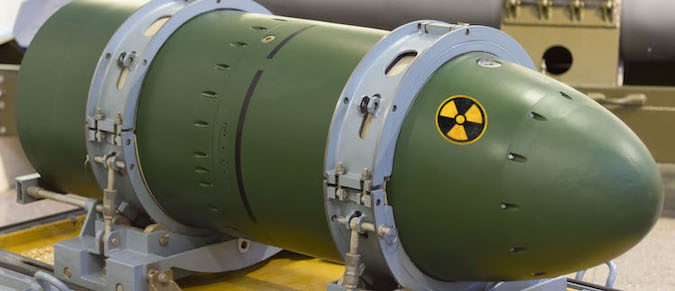By Aar Jay Persius
BERLIN (IDN) — “A nuclear war cannot be won and must never be fought.” On June 16, at their meeting in Geneva, US President Joe Biden and Russian President Vladimir Putin re-affirmed this fundamental truth, famously coined by their predecessors, Reagan and Gorbachev, at the last peak of the cold war, write the Foreign Affairs Ministers of Germany (Heiko Maas), Spain (Arancha González Laya) and Sweden (Ann Linde) in an article published in the German newspaper Rheinische Post on July 5. [2021-07-09 | 07] JAPANESE | SPANISH | SWEDISH
Back then, they recall, that sentence marked the beginning of a US-Soviet arms-control engagement beneficial to all humankind. Today, it instils new hope that the world can get back on the path of nuclear disarmament.
The three Foreign Affairs Ministers accentuate: “We need progress more than ever. Nuclear disarmament and non-proliferation agreements have crumbled in recent years. Renewed tensions and mistrust between global powers have undercut further reduction of nuclear arsenals in the past years.”
A case in point, they write is: “The Intermediate Nuclear Forces (INF) Treaty, one of the basic instruments for arms control, was terminated in 2019.” In fact, technological advance increases complexity, creates new risks and may even fuel a new arms race. “And regional proliferation challenges, such as Iran and North Korea, continue to demand our full engagement.”
The three Foreign Ministers published the article in the aftermath of the fourth ministerial meeting of the Stockholm Initiative for Nuclear Disarmament in Madrid on July 5.
Sweden launched the meeting with 16 Foreign Ministers from non-nuclear-weapon states (NNWS) at their gathering in Stockholm in June 2019 to “discuss how nuclear disarmament diplomacy can be advanced” by using a constructive, innovative, and creative approach that is able to respond effectively to the challenge presented by nuclear weapons.
The members of the Initiative span 16 states from all continents: Argentina, Canada, Ethiopia, Finland, Germany, Indonesia, Japan, Jordan, Kazakhstan, the Netherlands, New Zealand, Norway, the Republic of Korea, Spain, Sweden and Switzerland.
After the launch of the Initiative in Stockholm, the ministers met at their second meeting in Berlin in February 2020 and virtually in June 2020. The third ministerial gathering was held in Amman, the capital of Jordan on January 6, 2021.
On the occasion of that meeting, the United Nations Secretary-General, António Guterres, told the Stockholm Initiative for Nuclear Disarmament: “Individually, you represent different regions. Together, you represent a collective commitment to a world free of nuclear weapons”.
In their joint article, the three Foreign Ministers point out that in the four Ministerial meetings, the Initiative has developed more than 20 actionable proposals to reinforce the Non-Proliferation Treaty (NPT) and the implementation of its disarmament goals ahead of its upcoming Review Conference in August 2021.
The extension of the New START Treaty earlier this year through February 4, 2026, the prospect of new talks between Russia and the US on the future of arms control and risk reduction measures, and a new commitment to restraint at the highest political level, as expressed on June 16 in Geneva by the US and Russian presidents, they write, are good news. “These ideas figured among the ‘stepping stones’ that our initiative had proposed.”
While they welcome these positive developments, they encourage nuclear-weapon States to take further decisive steps towards disarmament. These may include reducing the role of nuclear weapons in policies and doctrines, minimising the risk of conflict and of accidental nuclear weapon use, further reducing stockpiles, and contributing to next-generation arms control arrangements.
In doing so, they support the UN Agenda for Disarmament and the views of several arms control and nuclear disarmament organizations around the world. This also applies to their call “once and for all” for putting an end to nuclear testing by bringing into force the Comprehensive Test Ban Treaty (CTBT), unblock negotiations on a treaty prohibiting the production of fissile material for military purposes, and developing robust and credible nuclear disarmament verification capacities.
“In other words,” they add, “We should learn from history and thereby build for the future. As part of this, we will strengthen our interaction with affected communities, including Hiroshima and Nagasaki, and our engagement with the younger generation. We will also strive for the full and equal participation of women in decision-making processes in the field of nuclear disarmament, as well as for the full integration of gender perspectives.” [IDN-InDepthNews – 09 July 2021]
Image Source: Geneva Centre for Security Policy




